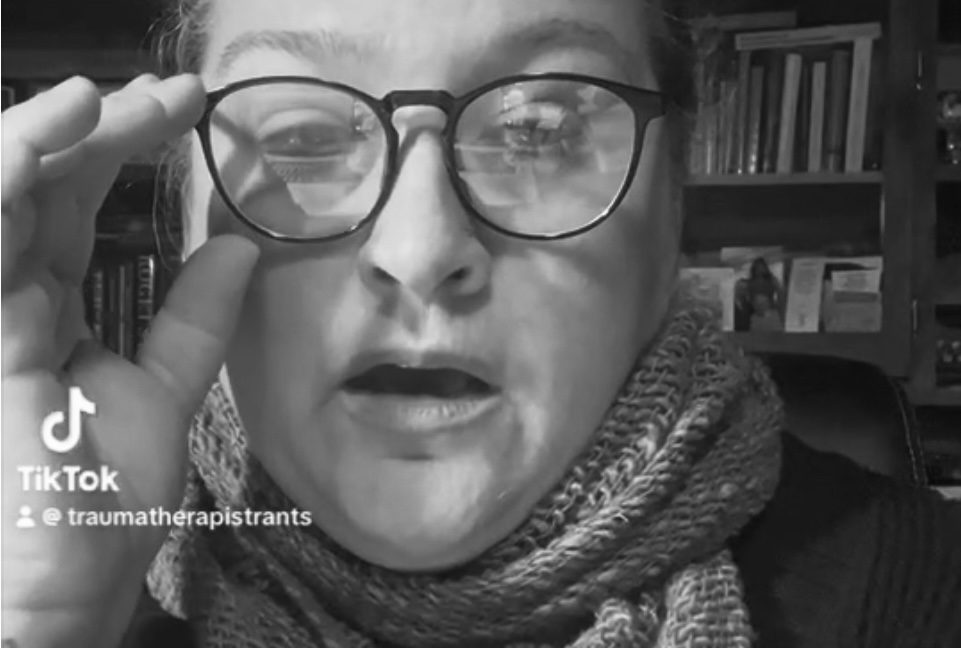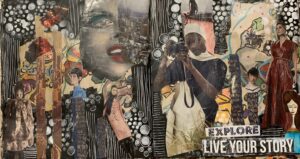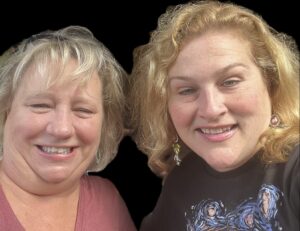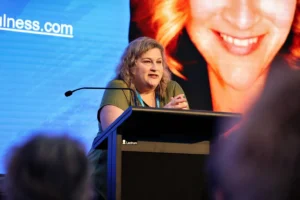Several days before the stunt of TikTok going dark for 12 hours in the United States, many creators posted content in the vein of, farewell, this is where you can find me. These messages largely contained a potent message of Thank You TikTok for helping me find my voice. Although I was already pretty outspoken before formally engaging with the app at the end of 2022, I also need to offer my thanks for what TikTok did for me and for my message.
This piece is not about politics or data breaches or any of the issues that others much more qualified than I will write about online. Rather, I want to thank TikTok for being an engine of public psychology and social art that has allowed so many people to connect in community and to have knowledge made more accessible. Sure, these things can be done on other platforms, yet there seemed to be something about the magic of TikTok’s initial one-minute video format (which later expanded) to get the point across in a succinct and often humorous way. This format also allowed many of us to work through or process some material as we uploaded our content to share.
I give credit to the social media team at North Atlantic Books, my current publisher, for getting me on TikTok. As we prepared to launch the campaign for Dissociation Made Simple: A Stigma-Free Guide to Embracing Your Dissociative Mind and Navigating Daily Life (January 2023), a member of the team asked me if I would consider getting on TikTok. Hesitant to learn yet another social media platform having already been on Facebook, Instagram, Twitter, and YouTube, I initially pushed back. During the late autumn of 2022, the social media team persisted in a gentle way, even giving me a one-sheet of ideas on videos that I could make. The wheels started turning since there was also a controversy that we addressed in Dissociation Made Simple about the rise of TikTokers with dissociative identities. Was the rising interest in dissociation and DID on TikTok genuine, or were people doing it just to fake it and make money?
In the book I took a neutral tone, expressing a general sense of concern that the most entertaining aspects of dissociative identities, regardless of the media format, always have the tendency to be highlighted for entertainment value. Yet I never clutched my pearls like so many other therapists around me who were concerned that now every teenager on their case load who watched TikTok seemed to think that they had DID. For me, social media has long presented an opportunity to open the door for conversations. I advised my colleagues, instead of shutting down people who watch TikTok, to use it as a vehicle for conversation. Be curious about what it is in the DID creators’ content that strikes a chord. And then listen and learn, perhaps using it as an opportunity to educate about the idea that we all have parts and aspects of self. Sometimes that manifestation is a “disorder” in scientific terms, other times not. My initial videos that I made on the app focused on looking at how routine life can sometimes feel as a person with dissociative identities who has experienced quite a bit of therapy. I also emphasized that no two systems are the same and I endeavored to show what my/our system looks like as a professional who lives with dissociative identities. Adding a voice to the chorus felt good. Yet I never anticipated how therapeutic speaking up in this way would become.
In the months before and after the release of Dissociation Made Simple, although unrelated to my book, many people who identify as having dissociative identities found themselves embattled with many of the reputable institutions and academics who study dissociation. In March 2023, the infamous “grand rounds” presentation at McLean Hospital in Boston where Dr. Matthew Robinson, during a public presentation that aired online, fake claimed many of the most widely known systems on TikTok in his presentation, using content from their social media in an exploitative way without their consent. You can read more about the incident, and several other institutional presentations with similar content from academics thinking that they know better than people who live with the condition at this still active petition which originated from the Plural Association.
I found a wonderful home in making short form videos on TikTok to speak out about the McLean incident and other issues of ableism and elitism in our professed allies who study dissociation. My videos also began exploring some of the issues that I highlighted in Dissociation Made Simple about what is wrong, in my opinion, with the clinical professions and the increasing commercialization of the trauma industry. Some of my favorites that you can check out include:
- A commentary on our obsession with what the white men write about trauma in books like The Body Keeps the Score
- A commentary on how people with lived experience of dissociation can be treated by the larger field, especially in conference spaces
- A commentary on the Multidimensional Inventory of Dissociation (MID) psychometric
- A commentary on overachieving therapist’s tendencies to want to get trained in everything
- And my most viewed TikTok, an excerpt teaching from Dissociation Made Simple on what not to do when someone dissociates
These videos have helped to get my message about the state of our field out there in a sometimes gut-punching, sometimes humorous (and often both) format. I began to feel those solid shifts in my mood and in my body that are evidence of trauma processing. Opening many of my videos with an uppity therapist character who casts down judgment on everything is not only a great hit with many of my online followers, embodying her helps me to get out the lingering impact of when I tried to live as a zipped-up human all in the name of being professional and building bridges. As an expressive arts therapist by background, such a phenomenon ought not surprise me. And as I began to experience the healing impact of my own social art, I grew even more frustrated with members of the academic and institutional establishment who are still trying to challenge and to even shut down the plural community online. Indeed, a open access article in the Harvard Review of Psychiatry by Michael Salter, Bethany Brand and Matthew Robinson, among others who are also complicit in fake claiming and shaming members of our community, released just a few weeks ago. The article, which is very difficult for many plural therapists to read, comes off as more of the same, a doubling down on and defending of their position instead of issuing a public apology to the people in the plural who they harmed by their presentations.
Once I saw what was happening on social media with all mental health, the fear of social media from establishment voices began to make more sense. When the community of people who identify with a condition or a way of being in the world begin to share their own knowledge and democratize it, the elite become less relevant. This phenomenon applies in mental health/psychology, in theology, and in politics. While I do not discourage the research that people in my professions do (in fact, I even cite it), I take issue with them not fully aligning with or prioritizing the voices of the people that they are serving. And while it can be the academic way to turn one’s nose up at social media as just a bunch of unfiltered pop psychology, my colleagues in the academic world are really missing the point of studying the human experience when they do this.
As I’ve witnessed the controversies about TikTok getting banned over the years, I concluded that the power of social media platforms to mobilize people and to share knowledge is the real threat to any establishment. And yes, I realize that there is a massive shadow side here as many fascist, problematically conservative, and conspiratorial forces are also doing the same with social media. People can get so wrapped up in their online world that it might cause problems to their mental health. We can address this phenomenon, especially as therapists, while also recognizing that for many marginalized people, social media connection with others is a solid resource.
One day social media may go down as the worst thing to ever happen to humanity, and I will gladly admit that I’m wrong and my opinions about the good it can do may change. Like any great tool, how social media gets used is imperative. Just as a hammer can be used to build a house, it can also be used to shatter glass. Those of us who use social media to get information out there have a right to be responsible and to be clear about our opinions, perspectives, and lived experience. And in an American society where social media is being used as a weapon, it is important that those of us with voices that counter any establishment or regime stay on it and speak. We are not going anywhere.




